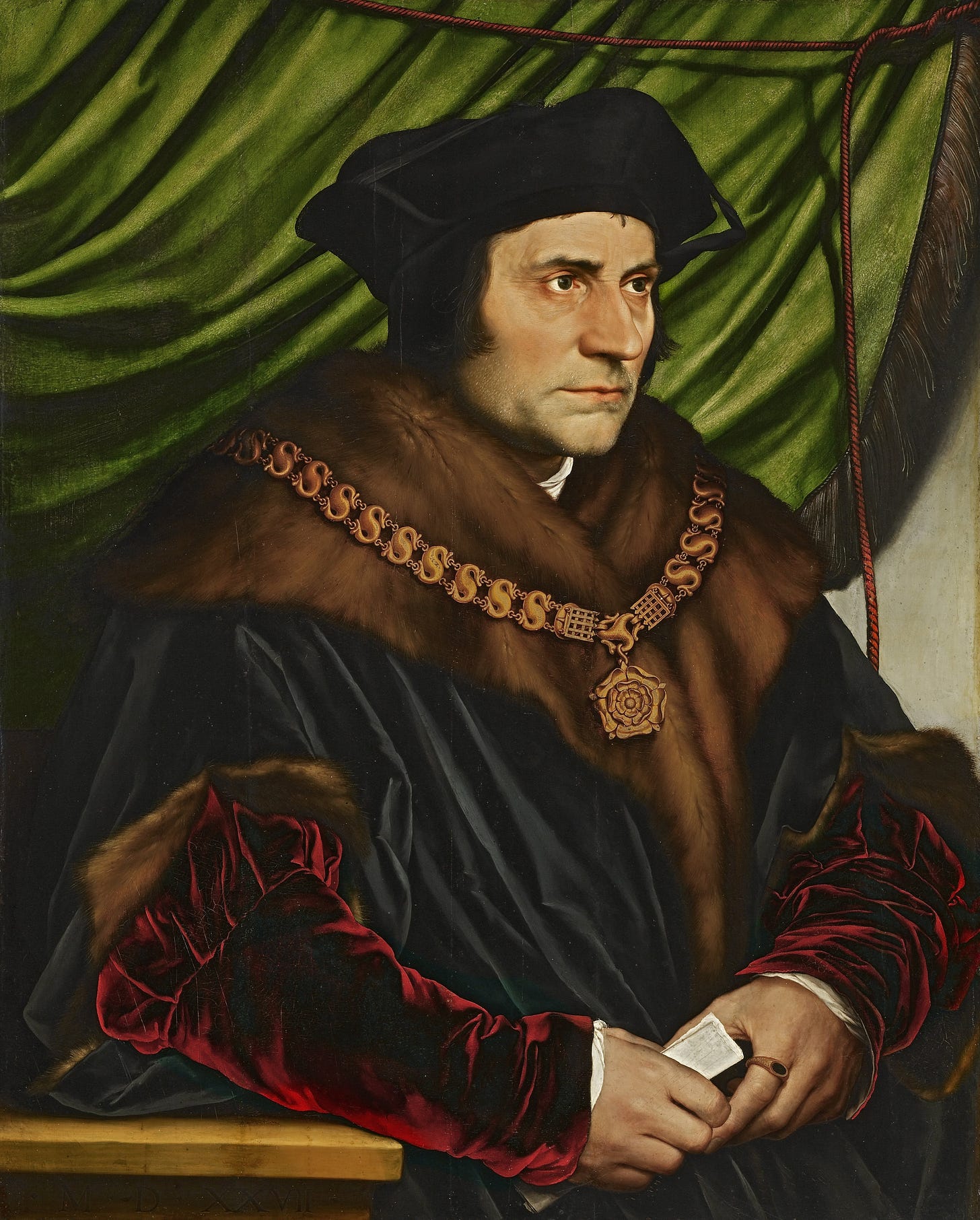Sir Thomas More by Hans Holbein the Younger (Image courtesy of Google Art Project)
“I think that when statesmen forsake their own private conscience for the sake of their public duties, they lead their country by a short route to chaos.” -Sir Thomas More (from A Man for All Seasons by Robert Bolt)
The first week of July is notable for the holidays celebrating the founding of two great nations (Canada Day on July 1 and Independence Day on July 4). But it also marks the anniversary of the trial and execution of a man whose legacy would shape the political development of both countries. On 1 July 1535, Sir Thomas More taken from the Tower of London to Westminster Hall and tried for high treason. Convicted on the basis of testimony that was almost certainly perjured, he was convicted and sentenced to be hanged, drawn, and quartered. Commuted by King Henry VIII to beheading, More’s sentence was carried out at Tower Hill on July 6. With his last words Sir Thomas declared, “I die the king’s good servant, and God’s first.”
Henry VIII’s decision to break with the Roman Catholic Church in order to divorce his first wife, Catherine of Aragon, and marry Anne Boleyn in the hope of fathering a son to succeed him is the pivotal moment of the last thousand years of English history. We would be well-advised to study this period, not only because of its influence on England and its colonies, but also because of the many parallels with our present situation. The tyrannical King Henry would not let anything get in his way of what he wanted and was unwilling to brook any dissent. He bent all the country’s institutions to his will: Parliament, the Church, and the universities. In the greatest disruption of English society since the Norman Conquest, the dissolution of the monasteries, Henry disbanded religious communities (abbeys, convents, priories, and friaries) across his domain, destroying the institutions which provided a social support system for the poor, infirm, and elderly. And most of his subjects went along with this radical reordering of their society, afraid of the king’s wrath.
There were some, however, who had the courage to stand up for what they believed to be right in the face of the king’s will. Among these was the Lord Chancellor, Sir Thomas More. More was a Renaissance man for all seasons. In addition to being a lawyer, judge, and statesman, he was also a patron of the arts (More was Hans Holbein the Younger’s first champion in England), a man of letters, and Christian humanist. According to the writer and Anglican cleric Jonathan Swift, More was, “a person of the greatest virtue this kingdom ever produced.” In Henry’s dispute over papal supremacy, More maintained the Pope was the apostolic successor of Peter according to Matthew 16:17-19. Steadfast in this belief and unwilling to act against it, Thomas resigned as Chancellor in May 1532. Although he kept his opinions private and didn’t openly dispute the King’s actions, More’s troubles were only beginning.
Having broken with Rome and declared himself Supreme Head of the Church of England, Henry annulled his marriage to Catherine and married Anne Boleyn, who was crowned queen on 1 June 1533. More’s refusal to attend the ceremony led to losing the King’s favor, and charges began to be made against him. After Parliament passed the Act of Succession in March 1534, More was asked to sign an oath repudiating the authority of the Pope. He refused to do so and, as a result, was imprisoned in the Tower of London. Repeatedly pressed to take the Oath of Succession, he continued to refuse, valuing his conscience over his life. Sir Thomas More was tried and found guilty of high treason on 1 July 1535, with his execution taking place five days later, when the fire of the tyrant’s wrath met the fire of his councilor’s love.
Although Henry took More’s life, having him condemned and executed as a traitor, he could not silence his subject’s faithful witness. G.K. Chesterton, who predicted More, “may come to be counted the greatest Englishman, or at least the greatest historical character in English history,” wrote, “the mind of More was like a diamond that a tyrant threw away into a ditch, because he could not break it.” As an outstanding representative of the English Martyrs, in May 1935 Pope Pius XI declared Thomas More to be a saint. In 2000, John Paul II named More as the patron of statesmen and politicians. More stands as a martyr for Catholic faith, for conscience, and for the rule of law. His ideas and his story went on to shape the development of laws and politics in the English-speaking world, helping give birth to the freedoms Americans and Canadians celebrate this first week of July. Ordered liberty and the rule of law are not permanent achievements, however. If we wish to keep them, it will be necessary to follow More’s example. I leave you with another quote from Robert Bolt’s play, A Man for All Seasons (which was subsequently adapted into one of my all-time favorite films):
“If we lived in a State where virtue was profitable, common sense would make us good, and greed would make us saintly. And we’d live like animals or angels in the happy land that needs no heroes. But since in fact we see that avarice, anger, envy, pride, sloth, lust and stupidity commonly profit far beyond humility, chastity, fortitude, justice and thought, and have to choose, to be human at all...why then perhaps we must stand fast a little—even at the risk of being heroes.”




